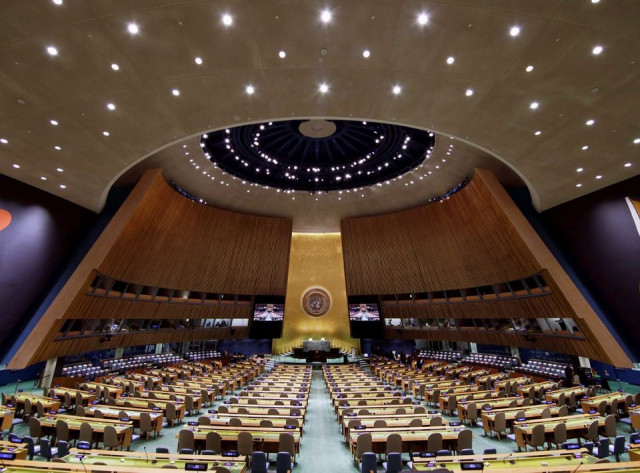At UNGA, Pakistan opposes ban on death penalty
UNGA passes resolution calling for ban on capital punishment with 127 votes cast in its favour

Pakistan has voted against the draft resolution calling for a moratorium on the capital punishment but a body of the UN General Assembly passed it anyway arguing that the death sentence was against the principles of human rights.
In Pakistan, the moratorium on the death sentence was imposed in 2008.
No executions were carried out from 2009 to 2011, with one in 2012 and none in 2013.
The moratorium was lifted after 149 people, including 132 schoolchildren, of the Army Public School, Peshawar, embraced martyrdom in a terrorist attack in December 2014.
Pakistan carried out seven executions in 2014, 326 in 2015, 87 in 2016, 65 in 2017, and 14 in 2018.
The 193-member UNGA's third committee, which deals with social, humanitarian and cultural issues, gave the nod to the draft resolution by casting 126 votes in its favour against the 37 that opposed it. There were 24 abstentions.
The UNGA would call on member states to “progressively restrict use of capital punishment, ensure that it is not applied on the basis of discriminatory laws, improve conditions in detention and establish a moratorium on executions with a view to abolishing the death penalty”.
The draft would come up for the UNGA’s endorsement next month.
“Justice systems are run by humans and are therefore exposed to mistakes and aggravated by social stigmas and political pressure, particularly in countries with no independent judiciary,” read a statement issued by the European Union.
“The death penalty primarily affects poorer persons and those belonging to marginalised groups,” it added.
After some countries called the draft flawed in an attempt to reinterpret existing human rights instruments, it was adopted following the approval of an amendment, which bagged 103 votes in favour of it against 68 members who opposed it.
There were a total of 13 abstentions.
The amendment affirmed “the sovereign right of all countries to develop their own legal systems, including determining appropriate legal penalties, in accordance with their international law obligations”.
Pakistan voted in favour of the amendment. However, it voted against the draft resolution.
The Pakistani delegate present there said while the amendment had been adopted, Islamabad did not agree with the overall framework of the draft resolution and therefore voted against it.
Maintaining that there was no consensus for or against the death penalty, he said every State had an inalienable right to decide its own laws.
The Pakistani delegate recalled that the International Covenant on Civil and Political rights allowed the capital punishment in a manner consistent with a State’s law and judicial processes.
“[The] death penalty, when applied in accordance with due process of law and judicial safeguards, does not infringe on any other human right,” the Pakistani delegate said.
“The right to life must be protected for the victims of horrific and most serious crimes as well,” he added.
Pakistan’s national legislation was in line with international human rights law, and the death penalty is only applied after adhering to the full due process of law, pursuant to a final judgment rendered by a competent court, and with the right to seek pardon or appeal for commutation, the delegate concluded.
(With input from APP)



















COMMENTS
Comments are moderated and generally will be posted if they are on-topic and not abusive.
For more information, please see our Comments FAQ